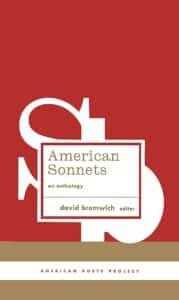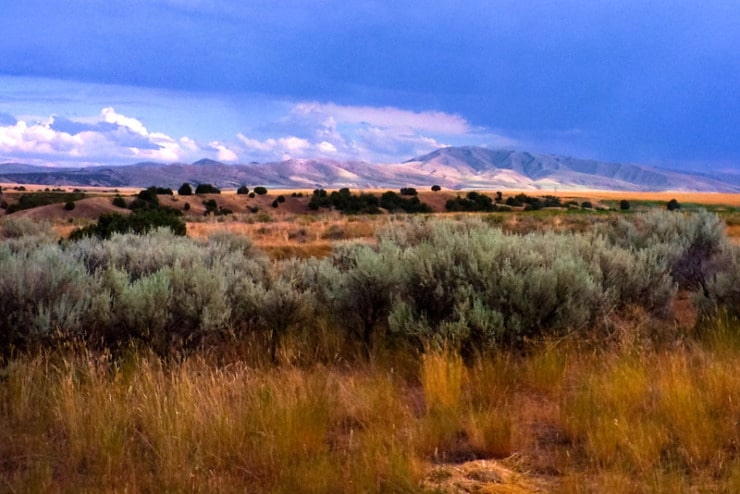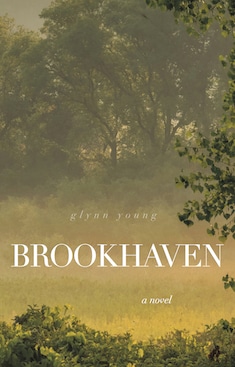David Bromwich has assembled a wide array of American sonnets
The sonnet form of poetry has been with us since the 14th century. We’re not sure who may have created it, but it was Petrarch (1300-1374) who made it popular. In the early 1500s, Sir Thomas Wyatt brought the Petrarchan sonnet to England, with his broadly popular translations as well as some of his own sonnets.
But it was William Shakespeare who made the love sonnet a staple of English literature. He adapted the form of the Petrarchan sonnet and gave it a distinctly English cast. John Milton and Edmund Spenser modified Shakespeare’s forms, but it was the sonnets of the bard that we think of today when someone says “sonnet.”
David Bromwich, professor of English at Yale University, assembled a volume of sonnets that demonstrate what happened to the poetic form once it jumped the ocean. First published in 2007, the appropriately titled American Sonnets covers roughly two centuries of composition of sonnets, including some by authors we might not have known were poets.

David Bromwich
We’d expect to find Henry Wadsworth Longfellow in an anthology like this, and we do, with six examples including “The Cross of Snow,” written in memory of his dead wife and still one of the most moving poems in American literary history. But we also find John Quincy Adams with the sonnet “To the Sun-Dial.”
It’s an anthology where you find both the expected and unexpected, the well-known poets and lesser-known poets. Among the former you find Henry David Thoreau, James Russell Lowell, Edwin Arlington Robinson, Edna St. Vincent Millay, Wallace Stevens, Conrad Aiken, Elizabeth Bishop, Richard Wilbur, John Berryman, and Adrienne Rich, among others. The lesser-known poets include Lizette Woodsworth Reese, Louise Guiney, Trumbull Stickney, H. Phelps Putnam, R.P. Blackmur, Edgar Bowers, and many others. The poet with the largest number of sonnets is Frederick Goddard Tuckerman (1821-1873), with 19. Many have one or two.
It’s no surprise, but Bromwich notes one poet as being the best-known writer of sonnets in English outside of Shakespeare, and that is Robert Frost. Twelve of Frost’s sonnets are included in the volume; “Stopping by Woods on a Snowy Evening” and “The Road Not Taken” are not among them. One Frost sonnet that Bromwich included is this simply exquisite poem.
The Silken Tent

At midday when a sunny summer breeze
Has dried the dew and all its ropes relent,
So that in guys it gently sways at ease,
And its supporting central cedar pole,
That is its pinnacle to heavenward
And signifies the sureness of the soul,
Seems to owe naught to any single cord,
But strictly held by none, is loosely bound
By countless silken ties of love and thought
To everything on earth the compass round,
And only by one’s going slightly taut
In the capriciousness of summer air
Is of the slightest bondage made aware.
An anthology often tells you as much about the editor as it does the included writers. This one is not meant to be representative and inclusive; it won’t punch all the appropriate cultural buttons. It is meant to provide an overview of some of the finest sonnets in American English and the poets who wrote them. You might argue with Edgar Allan Poe having only one poem included (To Science) and Tuckerman his 19, but Bromwich’s focus is the sonnet form, as opposed to the poet who wrote it. If you think “poem first, poet second,” you’ll see what he’s done with this anthology.
Bromwich received his B.A. degree from Yale in 1973 and his Ph.D. in 1977. From 1977 to 1988, he taught at Princeton University and then joined the Yale faculty in 1988. He’s published numerous books on the Romantic period, 18th-century politics and philosophy, William Hazlitt, Wordsworth’s poetry in the 1790s, essays on modern poetry, Edmund Burke, and other subjects. He is also a Fellow of the American Academy of Arts and Sciences.
Interestingly enough, although the sonnet is typically associated with love poetry, only some of the poems included in American Sonnets fit that description. It’s as if the sonnet form, once it crossed the Atlantic, retained some of its heritage but also managed to break free, exploring new themes and subjects and especially those helping shape a new nation.
Photo by Dawn Ellner, Creative Commons, via Flickr. Post by Glynn Young.
How to Read a Poem uses images like the mouse, the hive, the switch (from the Billy Collins poem)—to guide readers into new ways of understanding poems. Anthology included.
“I require all our incoming poetry students—in the MFA I direct—to buy and read this book.”
—Jeanetta Calhoun Mish
- Happy Thanksgiving, from Tweetspeak Poetry (and Henry Wadsworth Longfellow) - November 27, 2025
- Finding Poetry in an Anselm Kiefer Art Exhibition - November 25, 2025
- Poets and Poems: Autumn Williams and “Clouds on the Ground” - November 20, 2025



Leave a Reply